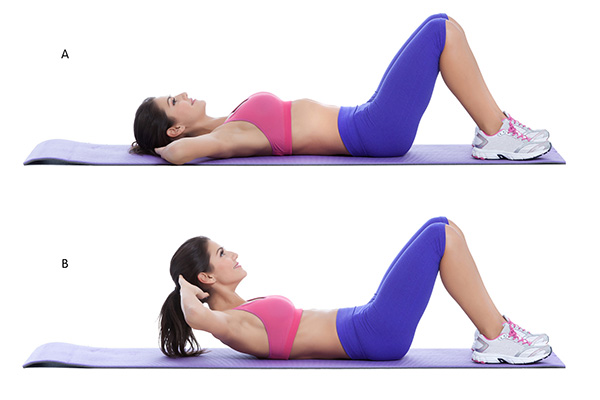An important and sometimes neglected step in stomach exercise routines is isolating particular muscles within the abdominal group. One such set of muscles which needs isolation in order to be exercised properly are the muscles in the lower stomach.
There are a number of stomach exercises which isolate and work these muscles. As with any workout routine, be sure to consult a professional before beginning and always warm up properly to avoid injury.
Crunchless Crunch
This first exercise is fairly simple but can also be fairly difficult. Essentially, it involves trying to pull the belly button in towards the spine. This can be tricky, as it involves using muscles which you may not be used to activating. To start, either lie or on your stomach or kneel.
You might want to try both ways and see which helps you feel the exercise better. Relax your body as much as possible, then try to use only the lower abdominals to move your belly button toward your spine. Hold for ten seconds.
If holding for ten seconds feels easy, hold for a longer period. The goal is to hold the contraction until you either cannot feel it, or you feel other muscles working harder than the transverse abdominus. When you feel this, let the contraction out.
Alternating Toe Touch
You will need to lie on a flat surface for this stomach exercise. The floor works best, using a mat or towel to cushion the spine. Lie on the floor and put your feet up in the air. Extend your right arm and use your lower abdominals to lift your shoulders off the floor. Touch your left toes with your right hand, then lower yourself back down.

Switch hands and repeat. Keep your knees straight throughout and maintain a space between your chin and chest.
Sit-Up Hold

While you are still on the floor, try this stomach exercise. Bend your knees so your feet are flat on the floor and position your hands behind your head. Keep your elbows back so you cannot see them do not put them alongside your head. Use your lower abdominals to lift your shoulders off the floor. Hold for ten seconds.
You may increase the number of seconds you hold as it gets easier. Be sure to lift with your abdominals and not with your arms or neck.
Lower Back Flatten
This stomach exercise is a good natural progression from the sit-up hold, as it starts from the same basic position: lying down, knees bent, feet flat. You may have noticed when you did the previous exercise that there is a natural space between your lower back and the floor, created by the curve of your spine.
In this exercise, you want to use your lower abdominals to push your lower back toward the floor and eliminate this space. Try to focus on pushing with only your lower abdominals and not your legs. Your pelvis will rotate slightly, which is fine so long as the lower abdominals are doing the work.
Once you have got your back flat to the floor, hold the contraction for ten seconds. Again, you should continue to build on this time as your stomach muscles gain strength and endurance.







